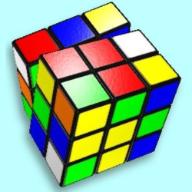It says, for what value of x is 4/x + 3/5 = 10/x?
Multiply each side by the LCD, 5x.
It's a prototype example to show how to do all other questions like it. But do they get the LCD from ALL of the denominators from each side of the equation (including the 5, and both x's), or do they get the LCD from ONE side of the equation (5 and just 1 x)?
Solving equations when there are variables in the denominator?
2020-08-29 9:47 pm
回答 (17)
2020-08-29 9:54 pm
Multiply each side by the LCD of all denominators on the both sides.
The LCD of all denominators (i.e. x, 5 and x) = 5x
(4/x) + (3/5) = 10/x
[(4/x) + (3/5)] 5x = (10/x) 5x
20 + 3x = 50
3x = 30
x = 10
The LCD of all denominators (i.e. x, 5 and x) = 5x
(4/x) + (3/5) = 10/x
[(4/x) + (3/5)] 5x = (10/x) 5x
20 + 3x = 50
3x = 30
x = 10
2020-08-29 11:49 pm
You look at all denominators, which as you said is a 5, x, and x.
The LCD is 5x meaning that each denominator is a factor of this expression.
you only need to count the x once here as once you find out that x is a factor of 5x, the second x is still a factor. Each is checked separately.
So in your case:
4/x + 3/5 = 10/x
Let's do this one step at a time if it makes it easier. We want to multiply both sides by (5x), so let's just do the 5, first. We get:
20/x + 3 = 50/x
Now multiply both sides by x:
20 + 3x = 50
Now we can finish:
3x = 30
x = 10
Also to note since we can't have a denominator with a zero in it, we should have said at the start of the question that x cannot be 0. So if for some reason you do end up with x = 0 as the solution you must throw it out and the answer is "no real solution exists".
The LCD is 5x meaning that each denominator is a factor of this expression.
you only need to count the x once here as once you find out that x is a factor of 5x, the second x is still a factor. Each is checked separately.
So in your case:
4/x + 3/5 = 10/x
Let's do this one step at a time if it makes it easier. We want to multiply both sides by (5x), so let's just do the 5, first. We get:
20/x + 3 = 50/x
Now multiply both sides by x:
20 + 3x = 50
Now we can finish:
3x = 30
x = 10
Also to note since we can't have a denominator with a zero in it, we should have said at the start of the question that x cannot be 0. So if for some reason you do end up with x = 0 as the solution you must throw it out and the answer is "no real solution exists".
2020-08-31 2:35 am
4/x+3/5=10/x
3/5=10/x-4/x
3/5=(10-4)/x
3/5=6/x
cross product
5*6=3*x
30=3x
x=30/3
x=10
Answer: 10
3/5=10/x-4/x
3/5=(10-4)/x
3/5=6/x
cross product
5*6=3*x
30=3x
x=30/3
x=10
Answer: 10
2020-08-30 6:48 pm
4/x + 3/5 = 10/x
[5(4) + 3(x)] / 5x = 10/x =>
20 + 3x = 50x / x = 50 (NB 'x' Cancels down)
20 + 3x = 50
3x = 30
x = 10
[5(4) + 3(x)] / 5x = 10/x =>
20 + 3x = 50x / x = 50 (NB 'x' Cancels down)
20 + 3x = 50
3x = 30
x = 10
2020-08-30 12:09 pm
4/x + 3/5 = 10/x
5x*(4/x + 3/5 = 10/x)
=4*5+3x=50
3x=50-20=30
x=10
5x*(4/x + 3/5 = 10/x)
=4*5+3x=50
3x=50-20=30
x=10
2020-08-30 9:13 am
4/x + 3/5 = 10/x
3/5 = 10/x - 4/x
3/5 = 6/x
3x = 30
x = 10
3/5 = 10/x - 4/x
3/5 = 6/x
3x = 30
x = 10
2020-08-30 1:19 am
4/x + 3/5 = 10/x
20 + 3x = 50
3x = 30
x = 10
20 + 3x = 50
3x = 30
x = 10
2020-08-30 12:17 am
4/x+3/5=10/x
=>
10/x-4/x=3/5
=>
6/x=3/5
=>
x/6=5/3
=>
x=6*5/3=10.
If you want to clear the denominators, you
should multiply both sides by 5x:
=>
20+3x=50
=>
3x=30
=>
x=10
but you should declare first that "if x=/=0"
for multiplying "0" is not allowed.
=>
10/x-4/x=3/5
=>
6/x=3/5
=>
x/6=5/3
=>
x=6*5/3=10.
If you want to clear the denominators, you
should multiply both sides by 5x:
=>
20+3x=50
=>
3x=30
=>
x=10
but you should declare first that "if x=/=0"
for multiplying "0" is not allowed.
2020-09-02 10:41 am
5 and x will be your lcd.
[4/x + 3/5 = 10/x]5x.......multiply the equation by 5x
20 + 3x = 50
3x = 50 - 20
3x = 30
x = 10 answer//
[4/x + 3/5 = 10/x]5x.......multiply the equation by 5x
20 + 3x = 50
3x = 50 - 20
3x = 30
x = 10 answer//
2020-09-01 12:01 am
4/x +3/5 =10/x
20x/x +15x/5 =50x/x (multiply by LCD of 5x)
20 +3x =50 (simplify)
3x = 30 (subtract 20 from both sides)
x=10 (divide by 3)
20x/x +15x/5 =50x/x (multiply by LCD of 5x)
20 +3x =50 (simplify)
3x = 30 (subtract 20 from both sides)
x=10 (divide by 3)
2020-08-31 6:05 am
You can always move all the terms over to one side, so that there is zero (or maybe 1) on the other side.
4/x + 3/5 = 10/x
4/x + 3/5 - 10/x = 0
3/5 - 6/x = 0
3x - 30 = 0
x = 10
4/x + 3/5 = 10/x
4/x + 3/5 - 10/x = 0
3/5 - 6/x = 0
3x - 30 = 0
x = 10
2020-08-30 1:55 pm
(4/x) + (3/5) = (10/x)...(1).;
Subtract (4/x) from both sides of (1) getting (3/5) = (10/x)-(4/x)...(2).;
Gather terms on RS of (2) getting (3/5) = (10-4)/x = (6/x)...(3).;
Multiply (3) through by 5x getting 3x = 5x(6/x) = 5(6) = 30...(4).;
Divide (4) through by 3 getting x = 10.
Subtract (4/x) from both sides of (1) getting (3/5) = (10/x)-(4/x)...(2).;
Gather terms on RS of (2) getting (3/5) = (10-4)/x = (6/x)...(3).;
Multiply (3) through by 5x getting 3x = 5x(6/x) = 5(6) = 30...(4).;
Divide (4) through by 3 getting x = 10.
2020-08-29 11:07 pm
If you multiply by 5x (or just x) on both sides, that gets rid of all the x's in the denominators and 3/5 becomes an x term.
2020-08-29 10:50 pm
When using this method, you are trying to get rid of ALL the denominators, so you multiply by the LCD of the denominators on BOTH sides.
LCD(x, 5, x) = 5x
Here's a different example:
12/x + 4/3 = 15/x - 1/6
LCD(x, 3, x, 6) = 6x
72 + 8x = 90 - x
9x = 18
x = 2
LCD(x, 5, x) = 5x
Here's a different example:
12/x + 4/3 = 15/x - 1/6
LCD(x, 3, x, 6) = 6x
72 + 8x = 90 - x
9x = 18
x = 2
2020-08-29 10:40 pm
If: 4/x + 3/5 = 10/x
Multiply all terms 5x and so: 20 + 3x = 50
Subtract 20 from both sides and so: 3x = 30
Divide both sides by 3 and so: x = 10
Check: 4/10 + 3/5 = 10/10 or 4/10 + 6/10 = 10/10 => 1
Multiply all terms 5x and so: 20 + 3x = 50
Subtract 20 from both sides and so: 3x = 30
Divide both sides by 3 and so: x = 10
Check: 4/10 + 3/5 = 10/10 or 4/10 + 6/10 = 10/10 => 1
2020-08-29 10:05 pm
Well, it looks like they got the LCD for both sides, which doesn't make sense, since cross-multiplying would handle that. There are so many ways to tackle this particular problem, it's kind of infuriating that they chose the denominators and methods that they chose.
For instance, since 4/x and 10/x have the same denominator, I would have put them both on the same side of the equation
4/x + 3/5 = 10/x
4/x - 4/x + 3/5 = 10/x - 4/x
3/5 + 0 = (10 - 4)/x
3/5 = 6/x
And then I would have cross multiplied:
3 * x = 6 * 5
Then I would have solved for x
x = 6 * 5 / 3
x = 30/3
x = 10
Or, going through their route, I would have just gotten the LCD for each side first
4/x + 3/5 = 10/x
4 * 5 / (5x) + 3 * x / (5x) = 10 / x
(20 + 3x) / (5x) = 10/x
And then cross-multiplied
x * (20 + 3x) = 10 * 5x
20x + 3x^2 = 50x
3x^2 - 30x = 0
3x * (x - 10) = 0
3x = 0
x = 0
x - 10 = 0
x = 10
Test both answers, because one of them may be extraneous. In this case, x = 0 is extraneous.
x = 10
In general, it's a bad idea to multiply out expressions which could give solutions, because there is a temptation to just remove those expressions. For instance, in this step:
x * (20 + 3x) = 10 * 5x
We could divide by x on both sides to get 20 + 3x = 50. In this particular problem, it wouldn't affect the answer, but there are times when it can. There are times when dividing out an expression (even just plain old x is an expression), can remove possible solutions from the set and give us an incomplete answer.
But their method was to get the LCD for everything
4/x + 3/5 = 10/x
5x * (4/x + 3/5) = 5x * (10/x)
20 + 3x = 50
As long as you remember to not get rid of possible solutions before you analyze the problem, their method should be fine, too. It just feels like more work than necessary, but that just may be because it's not my standard way of handling a problem like this.
For instance, since 4/x and 10/x have the same denominator, I would have put them both on the same side of the equation
4/x + 3/5 = 10/x
4/x - 4/x + 3/5 = 10/x - 4/x
3/5 + 0 = (10 - 4)/x
3/5 = 6/x
And then I would have cross multiplied:
3 * x = 6 * 5
Then I would have solved for x
x = 6 * 5 / 3
x = 30/3
x = 10
Or, going through their route, I would have just gotten the LCD for each side first
4/x + 3/5 = 10/x
4 * 5 / (5x) + 3 * x / (5x) = 10 / x
(20 + 3x) / (5x) = 10/x
And then cross-multiplied
x * (20 + 3x) = 10 * 5x
20x + 3x^2 = 50x
3x^2 - 30x = 0
3x * (x - 10) = 0
3x = 0
x = 0
x - 10 = 0
x = 10
Test both answers, because one of them may be extraneous. In this case, x = 0 is extraneous.
x = 10
In general, it's a bad idea to multiply out expressions which could give solutions, because there is a temptation to just remove those expressions. For instance, in this step:
x * (20 + 3x) = 10 * 5x
We could divide by x on both sides to get 20 + 3x = 50. In this particular problem, it wouldn't affect the answer, but there are times when it can. There are times when dividing out an expression (even just plain old x is an expression), can remove possible solutions from the set and give us an incomplete answer.
But their method was to get the LCD for everything
4/x + 3/5 = 10/x
5x * (4/x + 3/5) = 5x * (10/x)
20 + 3x = 50
As long as you remember to not get rid of possible solutions before you analyze the problem, their method should be fine, too. It just feels like more work than necessary, but that just may be because it's not my standard way of handling a problem like this.
2020-08-29 9:56 pm
4 3 10
-- + -- = ----
x 5 x
// Multiply both sides by 5x to get rid of fractions
4 3 10
5x (-- + -- ) = 5x (----)
x 5 x
20 + 3x = 50
3x = 30
x = 10.................ANS
----------------
CHECK YOUR ANSWER:
4 3
--- + --- =
10 5
4 6
--- + --- =
10 10
10
---................CORRECT!
10
-- + -- = ----
x 5 x
// Multiply both sides by 5x to get rid of fractions
4 3 10
5x (-- + -- ) = 5x (----)
x 5 x
20 + 3x = 50
3x = 30
x = 10.................ANS
----------------
CHECK YOUR ANSWER:
4 3
--- + --- =
10 5
4 6
--- + --- =
10 10
10
---................CORRECT!
10
收錄日期: 2021-04-24 08:00:03
原文連結 [永久失效]:
https://hk.answers.yahoo.com/question/index?qid=20200829134752AA57aXP








